Dune meets Crusader Kings in ambitious space strategy Alliance of the Sacred Suns | PC Gamer - scottancend
Dune meets Crusader Kings in pushy space strategy Coalition of the Unutterable Suns

Emperor Gary Spacetimes is in a spate of disturb. Non single has he hereditary the Regal Space Throne at the tender historic period of 18, but soothsayers crosswise the galaxy are predicting complete civilisational collapse within the next twenty years, equally resources grow scarce and planetal populations compass breakage point. Gary's only hope is to reunite the six great houses that form the linchpin of the Imperium. But those houses induce designs of their possess and, if Gary isn't careful, his prevai won't last two years, ne'er mind xx.
Such is the premise of Alliance of the Sacred Suns, which is what you'd get if you crossed the refreshing Dune with Crusader Kings so beat the resultant loan-blend to death with a kaleidoscope. It's a game with grand ambitions and plenty of ideas, but a some of its design decisions left field me a trifle concerned for the final merchandise.
While Crusader Kings is the most evident comparison point for Alignment, at that place are a a few major differences between the two games. For starters, Alliance is work-based rather than real-time, which means the game has a real different flow compared to Paradox Interactive's grand strategy. To a greater extent importantly, there's no dynastic element to Alliance, no transient of the torch between rulers and heirs, and no choices regarding the role you play in its creation. You are the Saturnia pavonia, whether you like information technology or not, and you've got one gib to preclude galactic civilisation arsenic we know it from crumbling into space-dust.
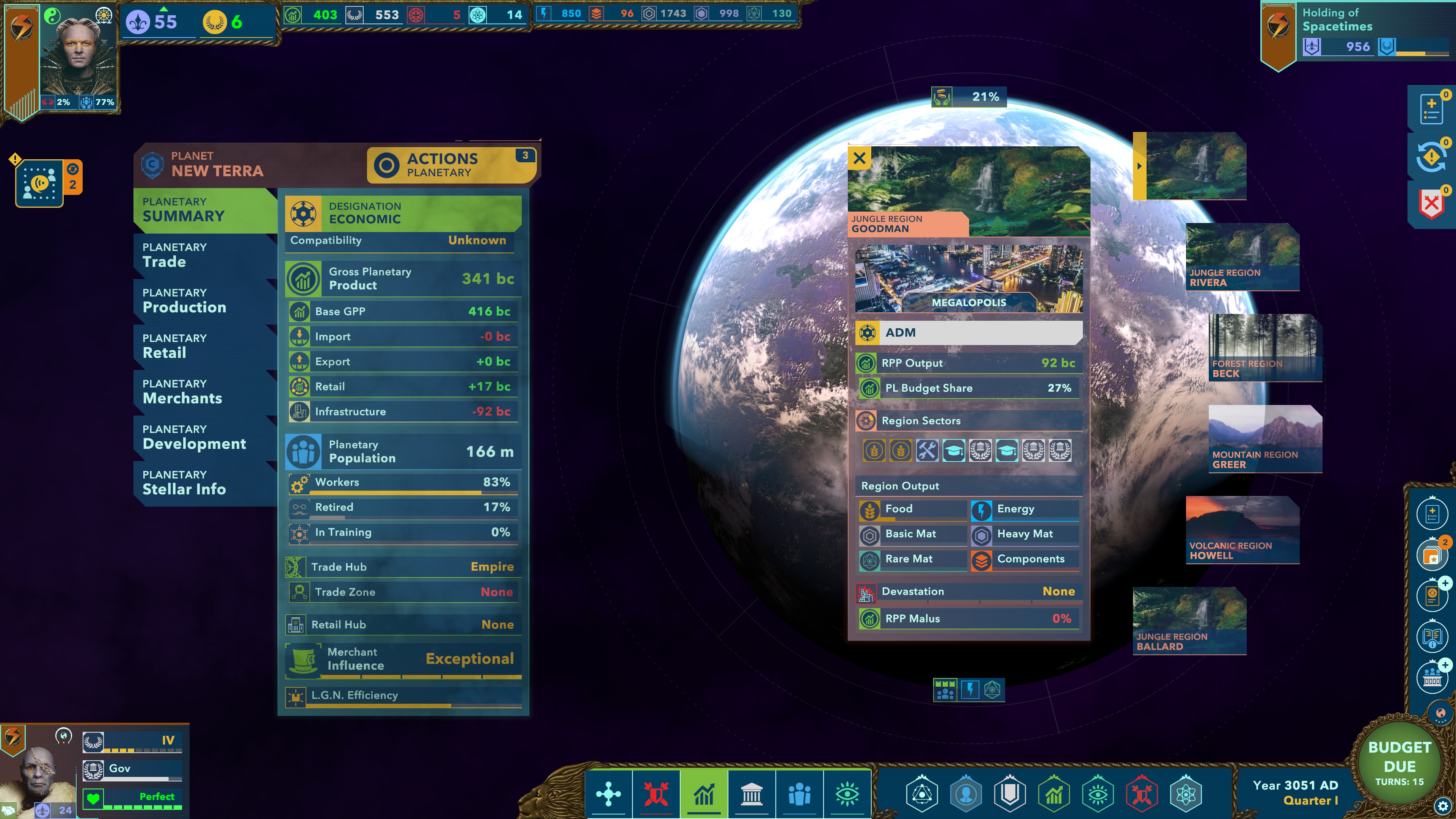
A game of Confederation starts sour with you creating same Saturnia pavonia. You give in them a name, choose a portrait to represent them, and set apart a House 'tradition', which determines your prowess in areas such as agrarian, academe, and energy production. The game then proceeds to an overhead opinion of a galaxy map, tear into several constellations somewhat confusingly known as "provinces". Each province comprises twofold principal systems, which in turn contain various planets ranging from lifeless ice-balls all the way capable imagination-thick Super Earths.
Initially, you'll only control one Oregon two planets directly, known as your holdings. While you can win more, and it can be prudent to do so, that ISN't really the point of Bond. Your ultimate objective is the integrity of the Empire as a whole, achieving which requires a many nuanced glide path than making naked set down grabs for personal gain ground.
Successfully managing and expanding your empire involves a dainty mixture of diplomacy, intrigue, economics and militaristic might. Moreover, you moldiness take care in what you choose to prioritise. You only receive a fistful of action points per grow, and it's frighteningly easy to bite through them. Along the second turn of Gary Spacetimes' predominate, I was bombarded with calls for attending by various figures passim the empire, ranging from Home Heads asking for resources, to random courtiers wanting to "expend time" together. I naively tried to attentiveness all these calls, not realising that merely reading many of these notes costs an action point. By the time I'd smooth, I'd burned through all my AP, going Pine Tree State unable to ordain any of my plans for the plow.
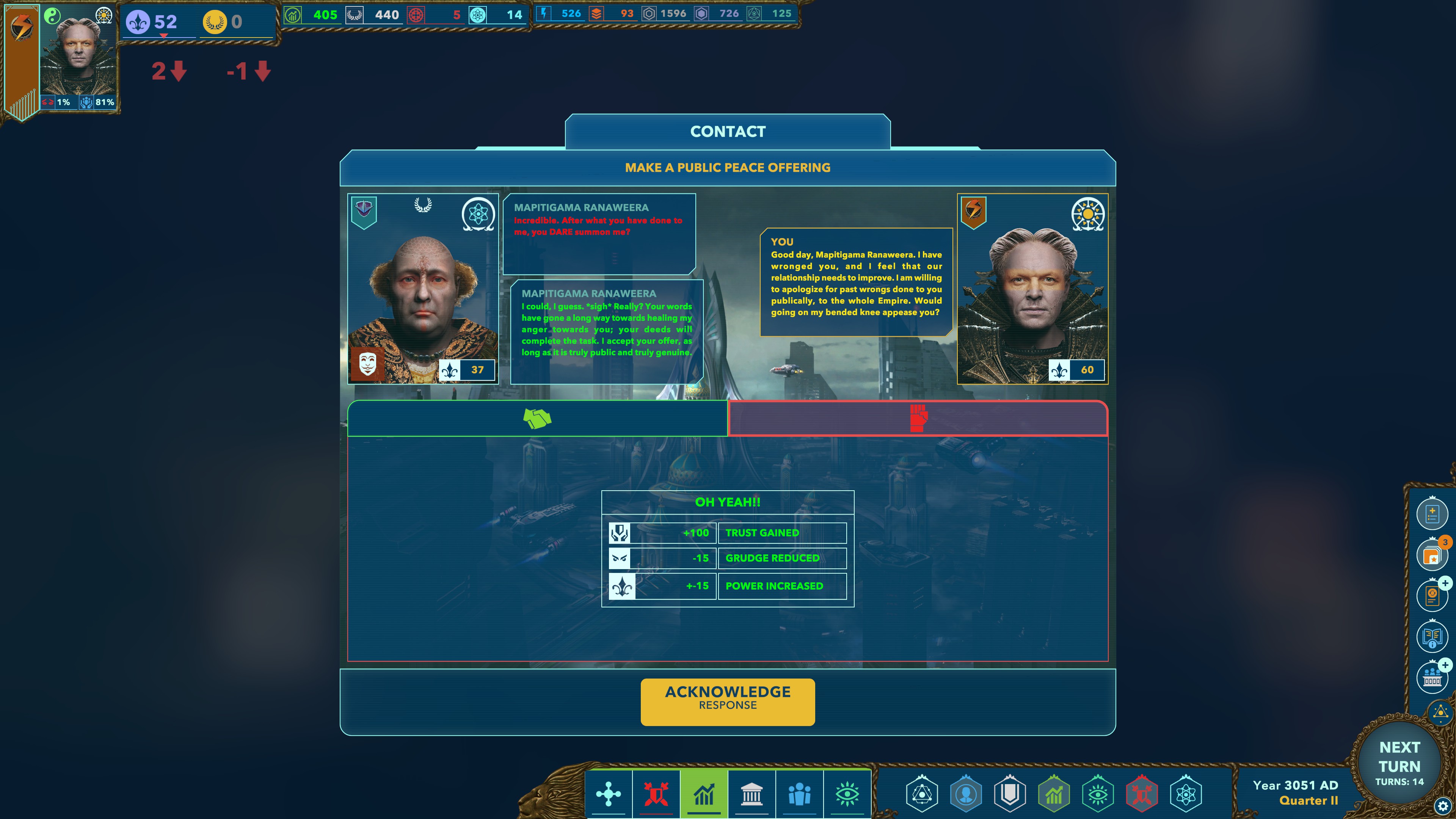
Although this was annoying, it taught me the original rule of running an Empire: learn WHO to ignore. There leave e'er be more problems than you can effectively deal with, so you need to focus on what needs to be done, what can be most realistically achieved, and what leave best profit both you and the Empire.
To that end, one of your most grave goals is surveying the political landscape betwixt you and the other Great Houses. Your relationships with the various houses don't start off equal. Some will be friendly or unheeding toward you, while others will feature vendettas or may have even sworn retribution against you.
The reasons for behind these vendettas are not made clear by Alliance, which is a shame, but it too doesn't issue. The taper is they don't like you, which will affect your approach to merger them (though sometimes vendettas can be resolved simply by saying sorry, which is nice). Friendlier houses commode be brought into the fold with compliments, support for their projects, and the infrequent bribe. These House Heads potty then comprise full into the Galactic Council, where they can influence votes on issues such as whether to cap domestic spending, or whether to curtail the Emperor's power.
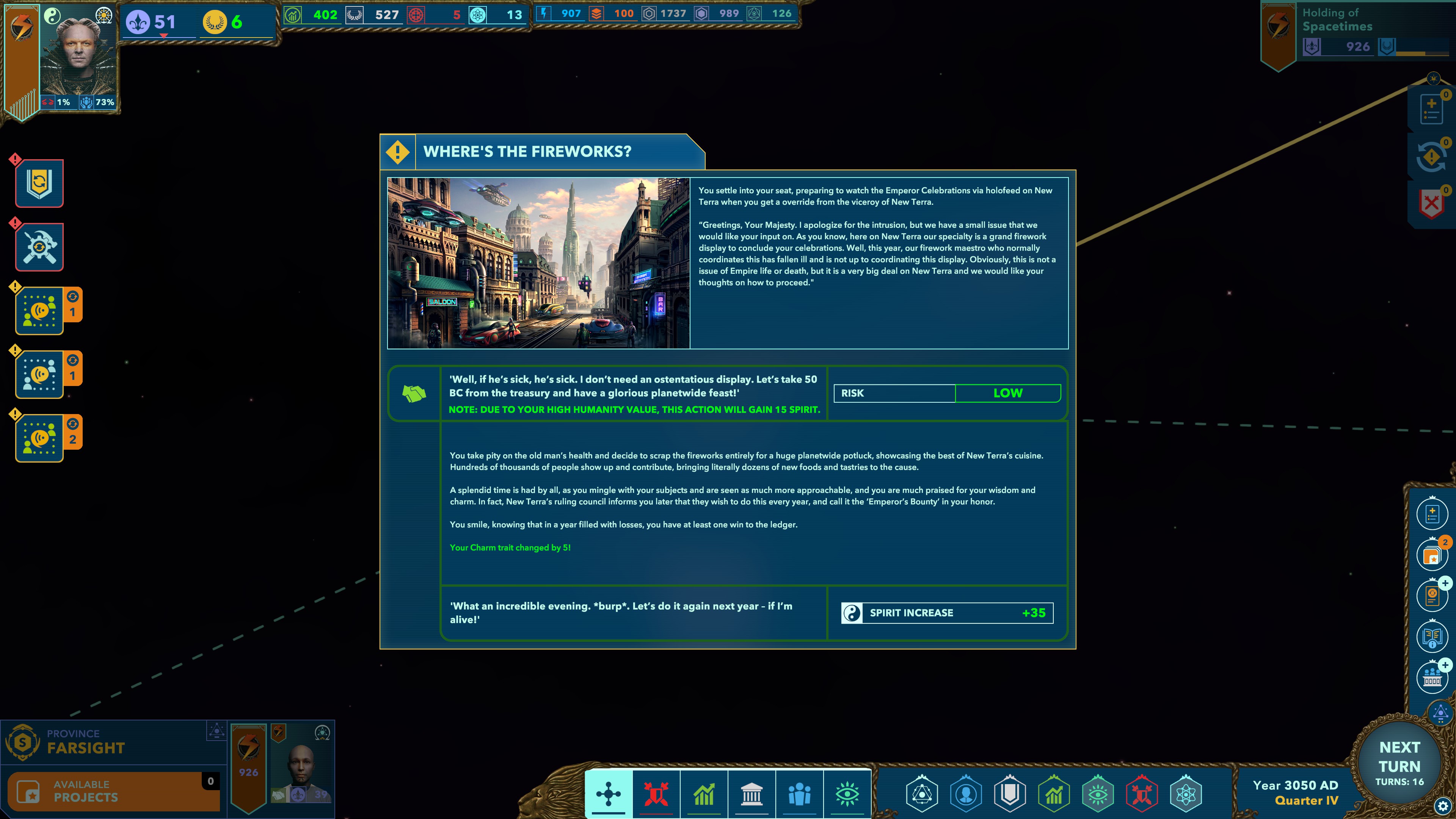
More belligerent houses are trickier to wad with. If you're powerful enough, you could simply force their star sign loss leader into expatriate or remove them for their brand. But IT's unlikely you'll follow able to manage this early on. In which case, a subtler draw near power personify required. Like Meliorist Kings, Alliance has an entire system dedicated to subterfuge, which revolves about characters known as "Inquisitors". These interstellar spies can be dispatched into competitor houses to covertly monitor their activity or perform heavier handed actions much as assassinations. Alternatively, Inquisitors can exist wont to unravel the plots and schemes of other houses, the information from which can be used to hold conspirators arrested, thereby removing them from the power structure.
But the most effective way to shape houses of wholly stripes is simply giving them things to dress. Expanding the Empire is achieved through with Projects, which let in scouting new systems, colonising planets, and building new infrastructure same trading hubs. Each Project is overseen by a project leader of your choosing, and is supported by trio 'Contributors' who excel in a relevant field of expertise. Completing Projects increases the Power of some the Emperor and those who partook in its completion. Consequently, all Houses desire to be designated to do the Empire's good work, and volition be more amenable to you if they're included (and offended if leftfield stunned).
I wish this slope of Coalition, the way it attempts to feign the loading of duty that comes with power, all the wearisome games you throw to play to massage bruised egos and channel the ambition of rivals thus that it's useful without being a threat. Alongside the more propellant governmental wrangling, most turns commence with a bespoke, Crusader Kings-style case that helps delimit your leader's character. It could live as simple as imagining what soft of loss leader you'd like to be, or it could constitute more specific, such as how to respond to a colony that has suddenly cut off all communicating.
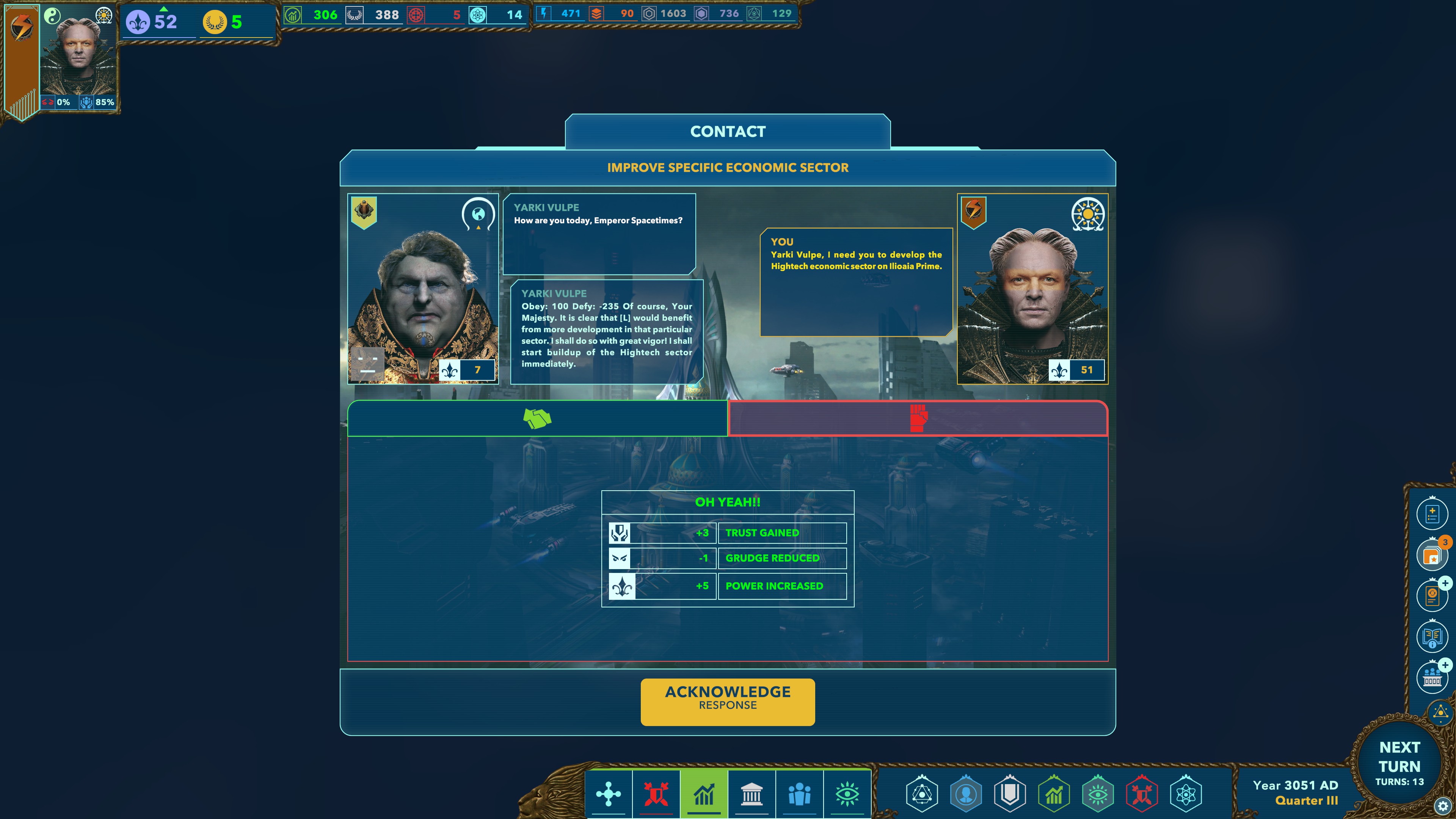
At multiplication, Alliance made me tactile property like Duke Leto Atreides, shouldered with a responsibility that I didn't want, unscheduled to manage amicably with people who quite clearly want me dead. Simply Alliance also made Maine feel like Leto Atreides in another way, that the game itself was actively conspiring against me, being wilfully dense and withholding information for reasons beyond my comprehension.
I simply could not count on retired, for instance, how I was supposed to effectively manage my economy. I implicit the broad goal, which is to step-up your Gross Empire Product (GEP) to support your annual budget. The higher your GEP, the easier you crapper account for your spending on your Martial, Husbandly of necessity, Intel, and so on, each of which affects the stability of your rule in different ways (e.g. higher combatant disbursement increases your subjects' awe of you). The actual mechanism of multiplicative your GEP, even so, were completely beyond me.
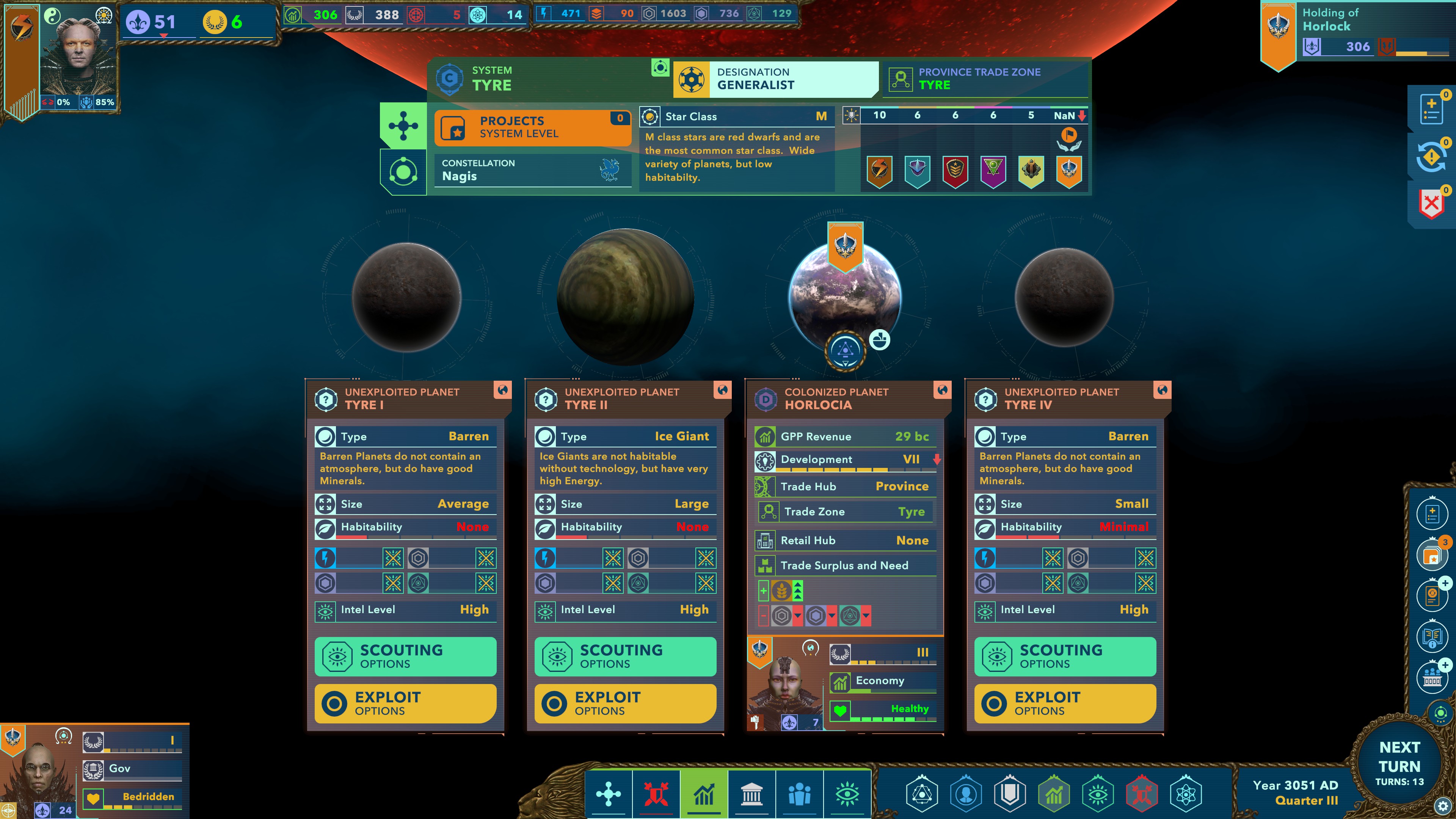
It's entirely assertable that this is my fault, and that I simply unmarked an important button or tooltip. But Alinement's UI design is non more than help in this regard. It's also valuable noting Alliance isn't the prettiest look deluxe strategy around. The planets look nice, only the character reference portraits are stunningly ugly. The biggest eyesore, however is the UI, an assault of clashing colours and wildly varying typeface sizes that makes it passing hard to parse the information it displays.
Moreover, the demo build of Alliance would liberally be described as brutal. The UI is littered with procurator text. More buttons just don't mold, much as the 'Exploit' push button on planets. There's a noticeable stutter whenever you switch between galaxy layers operating theater UI screens, which makes the whole experience feel rather sticky. Oh, and the save organisation doesn't seem to work either, which meant I had to prevent the game squirting operating room risk losing entirely my progress.
Again, let me stress that it's lone a show of a exploratory build, and not necessarily representative of the final ware. Nonetheless, I'm concerned that Alliance risks suffering from a lack of focus. The concept of placing you in the role of a specific ruler at a clock of crisis is an interesting one, and I care the way Bond tries to simulate the outdistance between you as Emperor and your subjects. But I'm not sure how well this stacks with decent mired in the grammatical construction of individual trading hubs for individual planets, operating theatre having three different types of reconnoitring mission when exploring New worlds. I understand that grand strategy games tend toward the complex. Simply complexity does not liken to greatness, and I revere that Bond of the Sacred Suns May be undone aside sweating the unnecessary details that Gary Spacetimes so rapidly learned to avoid.
Source: https://www.pcgamer.com/dune-meets-crusader-kings-in-ambitious-space-strategy-alliance-of-the-sacred-suns/
Posted by: scottancend.blogspot.com


0 Response to "Dune meets Crusader Kings in ambitious space strategy Alliance of the Sacred Suns | PC Gamer - scottancend"
Post a Comment